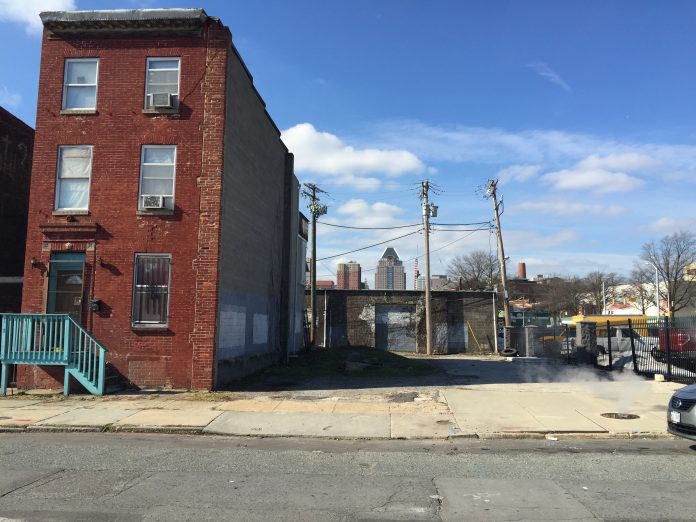
How cities are trying creative new approaches to link human rights and secure revenue. By Emily Green
Some of America’s post-industrial “rustbelt” cities are trying to fund deferred water infrastructure by collecting more revenue from a static customer base. In doing so they are triggering a vicious cycle of downward mobility, predatory debt collection, and an inner-city housing crisis.
These unintended local consequences reflect a globally escalating predicament: How can cities charge and collect for basic water provision from economically stressed families?
Low-income residents in depressed cities like Detroit, Philadelphia and Baltimore are facing water bills that have doubled, even tripled in recent years. At the same time, city water departments are determined to maintain bond ratings and pursue upgrades of antiquated systems. To balance the books, municipal utilities are stubbornly sending even small unpaid water bills to be redefined and re-classed as a property tax, or “water debt”, that can be bought and collected by third party intermediaries through what is called a tax lien sale.
Cities can justify this ‘tough love’ as providing them with a reliable source of new income. Baltimore has 1,500 miles of senescent service pipes being replaced at a rate of 15 miles a year, explains its public works spokesman Jeffrey Raymond. For cities like his, tax lien auctions allow free collection of overdue water bills, while speculators who buy up the water debt get a shot at property titles for pennies on the dollar.
Yet to the average citizen, tax lien sales of water debt amount to a big hammer wielded by dysfunctional agencies. Jersey City once threatened to send the Statue of Liberty to tax sale in a dispute over an unpaid water bill. Baltimore claimed to have reformed its billing system, until the day two foreign investors snapped up the water debt of the city’s two pro sports stadiums for less than US$70,000.
The city got its stadia back but one of its citizens, Vicky Valentine, wasn’t so lucky. When the unemployed counsellor couldn’t pay a US$362 water bill, the city sent it to a tax lien sale. It was compounded by 18 percent interest. Then it ballooned with lawyer fees. Soon the water bill had swollen to US$3,603.41, which the mother of four had no hope of raising. By that time she had lost her house.
She’s hardly alone in Baltimore; the challenge appears to be national, even international in scope. Nowhere is the desolation left behind by the hardline approach more vivid than in and around Detroit. From 2013 to 2015, that city’s water department shut off more than 50,000 homes, igniting chaos there and in already devastated nearby Flint, which this July issued more than 8,000 delinquency warnings for water that was, by its own admission, undrinkable.

But ‘tough love’ is neither inevitable nor even all that effective. A forensic 2016 review of the Detroit crisis by Suffolk University human rights lawyer Sharmila Murthy reveals how it all could have gone differently, and better. Murthy reports how in 2005, Roger Colton, a utility pricing consultant, recommended that instead of hounding low-income residents Detroit simply charge 2-3 percent of household income, roughly what its poorest could afford. The City Council adopted his recommendations, but the water authority and city lawyers rejected such logical advice.
“The challenge in Flint and Detroit was that the backstory of emergency management reflected a dysfunction that led to another kind of dysfunction,” says Murthy. “There was such focus on the bottom line that common sense was thrown out the window.”
While the arid Western US suffers from scarcity, the worst of these urban fresh water crises are, ironically, taking place in cities with abundant reserves: Detroit with Lake Huron, Philadelphia with the Schuylkill River Watershed, and Baltimore with the thickly veined tributaries of the Chesapeake Bay.
“It’s not the cost of the water that’s expensive,” explains Baltimore fair housing and tax reform advocate Dan Ellis. “It’s the delivery systems. These were built long ago and they’ve got to a point where they’re disintegrating and the cost of upgrades is billions and the cost needs to be paid. The federal government has not chosen to put money in generally and, because of that, it’s fallen upon local municipalities. That’s part of the struggle. It’s resulted in very significant increases. In the last ten years water bills in Baltimore have almost tripled.”
Similar hikes are found across other rustbelt cities studied by Colton. Instead of steadying the city, water shut-offs and tax lien foreclosures are playing a hidden but acute role in driving wholesale urban collapse. Detroit may have 80,000 vacant homes, Philadelphia 25,000, and Baltimore 17,000. To be sure, it’s unclear how many homes were foreclosed on because of debt that started as unpaid water bills, but the 2014 Abell Foundation report The Steep Price of Paying to Stay: Baltimore City’s Tax Sale, the Risks to Vulnerable Homeowners, and Strategies to Improve the Process suggests it is a significant proportion.
Of almost 6,000 tax debts auctioned by Baltimore in 2013 alone, the Abell report found, a third were owner-occupied; of these, more than five hundred were foreclosed on for unpaid water bills alone and hundreds more were combinations of property tax and water. Huffington Post reporter Fred Schultz discovered hedge funds had bought up tax sales, then bundled the debt together much as sub-prime mortgages were traded before the crash.

By 2014, Detroit’s internationally shocking disconnection rate helped Philadelphia City Councilwoman Maria Quiñones-Sánchez justify taking the exact opposite action. Sanchez worked with Roger Colton reviewing payment data, and was stunned by what she found. “Twenty percent of delinquent water accounts in Philadelphia were located in my district which is home to roughly 10 percent of the population,” she recalls. “We drilled down to block-by-block data on this and saw that working poor neighbourhoods with high household-debt ratios were the hardest hit.”
Joined by Robert Ballenger, an attorney with Community Legal Services of Philadelphia, Sanchez and Colton examined what worked and, just as importantly, what didn’t work. Counter-intuitively, most existing financial aid schemes often made things worse. “We saw over time that with families that participated in low- income programmes, historically the average indebtedness went up,” Ballenger says. While they were getting help, rate hikes and the cost of living were outstripping the assistance.
Colton made Philadelphia a paradoxical recommendation: charge less to earn more. The vast majority of water debt–98 percent–was more than two years old, he stressed, and unlikely to ever be collected, since the city’s steadily deteriorating housing stock was swiftly becoming worthless. “Not only are you losing the revenue by billing more than people can afford to pay, you’re spending money in an unsuccessful effort to collect revenue,” says Colton.
So for two years, Sanchez helped craft legislation designed to let the poorest Philadelphians pay what they could afford–from two to four percent of their household income. Debts were suspended, with interest forgiven for those customers who stay current.
At the centre of the programme is Colton’s golden rule: “You can’t generate the money you need by sending out bills that people can’t afford to pay.”
The approach conforms to the US Environmental Protection Agency’s recommendations, but the high stakes give it a decidedly international tone. Since the United Nations 2010 resolution recognising a human right to water, only California has encoded it in state law. When Philadelphia’s Tiered Assistance Program created by Sanchez’s bill took effect on July 1st, it was the first city in the country to have openly designed a fiscal policy that observed, if not codified, the human right to water.

Sanchez shrugs off the global import, and argues that it’s simply good business. “We do subsidies for developers all the time,” she says. “We do it at a bat of an eye. We do Tifs [tax increment financing]. We do those things because we understand that development needs incentive. Doing this other part, incentivising the poor to come back into the payment system, shows the fairness in our approach.”
Impressed by the Philadelphia work, Mary Washington, a Baltimore City delegate to the Maryland General Assembly, drafted a bill ending referral of water bills to tax lien sales. The assembly passed it overwhelmingly last March, but it died in the senate. In May, a revenue-hungry City of Baltimore finance director forwarded an estimated 1,000 overdue water bills to its May tax sale.
Mary Washington is now lobbying Baltimore City Council to follow Philadelphia’s suit. For affordability analyst Colton, humane water rates are key to overcoming the city’s twin plagues of homelessness and urban decay. “If you lose your electricity, your home isn’t deemed uninhabitable,” he says. “If you lose water and sewer service, your home is deemed uninhabitable. But there is no overarching regulatory structure. Maybe Philadelphia will help Baltimore and people will begin to say, maybe this does make sense.”
Above all, he says, the lesson that other struggling cities can take from Detroit and Philadelphia is that you can’t plan an infrastructure revival on collecting money that residents don’t have.







